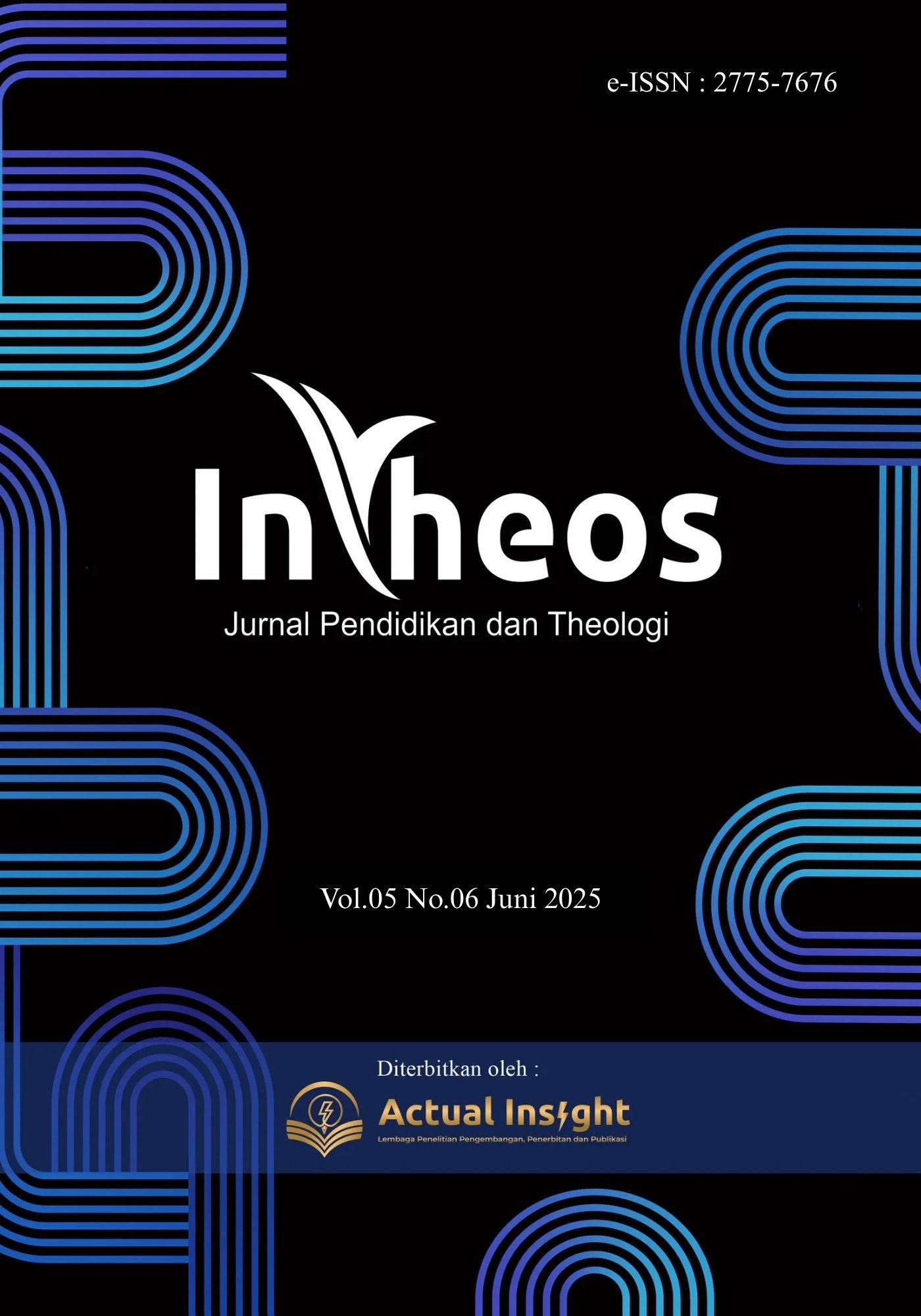

Dari Legalitas ke Belas Kasih: Keadilan dalam Dialog Hukum dan Teologi Kristen
-
Universitas Pembangunan Jaya
-
Sekolah Tinggi Teologi Internasional Harvest
DOI:
https://doi.org/10.56393/intheos.v5i6.2919-
Keadilan merupakan nilai moral dan institusional yang sangat penting dalam membentuk struktur hukum, masyarakat, dan iman. Studi ini menyajikan tinjauan literatur sistematis (Systematic Literature Review/SLR) dengan pendekatan PRISMA untuk mensintesiskan dan menganalisis secara kritis konsep keadilan dari perspektif sistem hukum sekuler dan teologi Kristen. Keadilan dalam hukum menekankan pada keadilan prosedural, kesetaraan di hadapan hukum, dan rasionalitas formal. Sebaliknya, dalam teologi Kristen, keadilan dipahami sebagai perwujudan kasih Allah yang restoratif, penuh belas kasih, dan berpihak kepada yang tertindas. Dengan menelaah pemikiran tokoh-tokoh seperti Agustinus, Thomas Aquinas, Reinhold Niebuhr, dan Nicholas Wolterstorff, artikel ini mengungkap dimensi moral dan relasional dari keadilan Kristen. Hasil kajian menunjukkan bahwa integrasi pendekatan hukum dan teologi Kristen dapat memperkaya pemahaman keadilan secara lebih menyeluruh dan etis dalam masyarakat pluralistik. Sintesis ini penting untuk membangun kebijakan publik yang adil dan etika hukum yang manusiawi. Kajian ini juga menegaskan bahwa iman memiliki peran vital dalam memotivasi tindakan keadilan sosial. Pada akhirnya, keadilan dipahami bukan hanya sebagai norma legal, tetapi sebagai komitmen moral yang transformatif dan berakar pada kasih serta iman yang aktif.
-
Allan, T. R. S. (2014). Freedom, Equality, Legality. Ius Gentium, 38, 155 – 169. https://doi.org/10.1007/978-3-319-05585-5_11
Andrews, N. (2012). Fundamental principles of civil procedure: Order out of chaos. In Civil Litigation in a Globalising World. https://doi.org/10.1007/978-90-6704-817-0_2
Aquinas, T. (1981). Summa Theologica. Christian Classics.
Augustine. (2024). City Of God. Ochreland Publishing.
Bhuiyan, M. J. H., & Jensen, D. (2020). Law and Religion in the Liberal State. In Law and Religion in the Liberal State.
Brčić, M. (2010). The difference principle the key to a just democratic society. Filozofska Istrazivanja, 30(1–2), 61 – 78.
Bredneva, V. S. (2014). Justice as a principle of law and basis of legal practice. Asian Social Science, 10(24), 224 – 230. https://doi.org/10.5539/ass.v10n24p224
Coughlin, J. J. (2012). Law, Person, and Community: Philosophical, Theological, and Comparative Perspectives on Canon Law. In Law, Person, and Community: Philosophical, Theological, and Comparative Perspectives on Canon Law (Vol. 9780199756). https://doi.org/10.1093/acprof:oso/9780199756773.001.0001
De Cremer, D., & Van Dijke, M. (2009). Acting fairly to be the boss: Procedural justice as a tool to affirm power relationships with subordinates. In Power and Interdependence in Organizations (pp. 118–132).
Deagon, A. (2014). On the symbiosis of law and truth in Christian theology: reconciling universal and particular through the Pauline law of love. Griffith Law Review, 23(4), 589 – 611. https://doi.org/10.1080/10383441.2014.992823
Deák, D. (2019). Spirituality and law. In The Routledge International Handbook of Spirituality in Society and the Professions. https://doi.org/10.4324/9781315445489_33
Freeman, S. (2018). Rawls on distributive justice and the difference principle. In The Oxford Handbook of Distributive Justice. https://doi.org/10.1093/oxfordhb/9780199645121.013.2
Ghai, Y., & Cottrell, J. (2009). The rule of law and access to justice. In Marginalized Communities and Access to Justice. https://doi.org/10.4324/9780203866405-6
Gomes, S. (2019). Access to Law and Justice Perceived by Foreign and Roma Prisoners. Race and Justice, 9(3), 359 – 379. https://doi.org/10.1177/2153368717699972
Harris, E. M. (2021). Rule of Law and Lawcourts. In The Cambridge Companion to Ancient Athens. https://doi.org/10.1017/9781108614054.029
Hiebert, D. (2023). The Recurring Christian Debate about Social Justice. In The Routledge International Handbook of Sociology and Christianity. https://doi.org/10.4324/9781003277743-46
Jakić, M. (2021). The Influence of Christianity on the Philosophy of John Rawls. Diacovensia, 29(3), 299 – 319. https://doi.org/10.31823/d.29.3.1
Jamnik, A. (2021). Rawls’ Theory Of Justice As Fairness: Philosophical – Theological Interpretation. Bogoslovska Smotra, 91(5), 1037 – 1058. https://doi.org/10.53745/bs.91.5.3
Johansen, T. O. (2024). Concepts of justice beyond suum cuique: Equivalence, law, righteousness, and love. Studia Theologica - Nordic Journal of Theology. https://doi.org/10.1080/0039338X.2024.2407958
Kirchschläger, P. G. (2013). Justice and its Christian socio-ethical relevance. Zeitschrift Fur Katholische Theologie, 135(4), 433 – 456.
Koepsell, D. (2016). Law and morality in Breaking Bad: The aesthetics of justice. In Philosophy and Breaking Bad. https://doi.org/10.1007/978-3-319-40343-4_7
Luban, D. (2015). Justice and Law. In International Encyclopedia of the Social & Behavioral Sciences: Second Edition. https://doi.org/10.1016/B978-0-08-097086-8.86043-2
Machin, D. (2013). Rawls’s difference principle as compensation for social immobility. Political Quarterly, 84(4), 506 – 514. https://doi.org/10.1111/j.1467-923X.2013.12049.x
Meteňkanyč, O. M. (2023). The relevance of legal intuitionism and selected moral emotions in legal thinking and decision-making processes. In A Conceptual and Semantic Analysis of the Qualitative Domains of Aesthetic and Moral Emotions: An Introduction. https://www.scopus.com/inward/record.uri?eid=2-s2.0-85186825444&partnerID=40&md5=64fc17af5ee02c8e34d6c3b6ef6f53eb
Montini, G. P. (2024). The Importance of the Judicial Function in Current Legal Systems. The Situation in Canon Law; Ius Canonicum, 64(127), 163 – 190. https://doi.org/10.15581/016.127.012
Niebuhr, R. (2021). Moral Man and Immoral Society. Must Have Books.
Pleasence, P., & Balmer, N. J. (2019). Justice & the capability to function in society. Daedalus, 148(1), 140 – 149. https://doi.org/10.1162/DAED_a_00547
Reidy, D. A. (2010). Rawls’s religion and justice as fairness. History of Political Thought, 31(2), 309 – 343.
Simpson, H. (2023). Access to justice in revenue-seeking legal institutions. Journal of Theoretical Politics, 35(2), 75 – 99. https://doi.org/10.1177/09516298231162040
Stumpf, K. H., Becker, C. U., & Baumgärtner, S. (2016). A Conceptual Structure of Justice - Providing a Tool to Analyse Conceptions of Justice. Ethical Theory and Moral Practice, 19(5), 1187 – 1202. https://doi.org/10.1007/s10677-016-9728-3
Subhalakshmi, G. (2022). Delay in Disposing Legal Disputes: A Study Factoring Mental Health and Way Forward. In Handbook of Health and Well-Being: Challenges, Strategies and Future Trends. https://doi.org/10.1007/978-981-16-8263-6_32
Wandi. (2020). Protection for informal sector workers towards employment systems that is justice. International Journal of Scientific and Technology Research, 9(3), 867 – 873.
Wolterstorff, N. (2010). Justice: Rights and Wrongs. Princeton University Press.
Zhibin, X. (2020). How is love possible for justice? Sino-Christian Studies, 2020-June(29), 157 – 180.
-
Downloads
Download data is not yet available.
How to Cite

This work is licensed under a Creative Commons Attribution-ShareAlike 4.0 International License.


e-ISSN : 2775-7676 p-ISSN : 2776-7450
Indexed by:
Indexed by:








